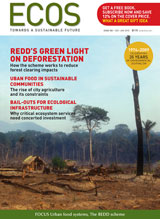
|
Published:
Human decision-making and behaviour
How can people be motivated to make more sustainable choices in their lives? While there has been much public debate about incentives, disincentives, tougher regulations and the need for more public education campaigns, a much more cost-effective approach – based on simple positive feedback signals – is already proving its value.

|
|
Smart meters are proving very effective at influencing domestic energy habits through their visually displayed feedback about energy and water usage. Credit: The Owl
|
Unlike the well behaved agents in economic models, people tend to act irrationally, often making decisions that do not appear to be in their best interests. For instance, many people don’t save enough money for retirement, don’t follow diet and health advice, or fail to use energy (and money) saving devices.
More encouragingly, people are also prepared to sacrifice their narrow economic self-interest to help others, for example by supporting charities and environmental causes.
It is more realistic to consider people as ‘boundedly rational’. They don’t think through every decision in detail, instead relying on habit, or simple rules such as ‘choose the one you recognise’ or ‘do what everyone else is doing’. The more complex the decision, the less likely people are to think it through. In fact, if a decision is too hard, people may just avoid making it altogether (‘I’ll sort out my superannuation later ...’).
Research in behavioural economics and psychology is helping us understand how we, as human beings, make decisions. The results of this work can be applied to designing better public policy, and to helping people help themselves by avoiding some of the pitfalls of bounded rationality.
One such application is in assisting households to reduce electricity use, which can contribute to reducing greenhouse gas emissions, relieving the pressure on electricity infrastructure while saving households money. The complicated nature of electricity means that, for most people, it is effectively ‘out of sight, out of mind’. They have little idea of their daily use; the only feedback most people receive is a quarterly bill with a total consumption figure that is difficult to relate to particular actions.
By taking a ‘behavioural’ approach to reducing energy use, electricity providers can make people more aware of the consequences of their energy decisions. Providing consumers with feedback on their electricity use – for example, by installing meters that display daily or hourly usage – can significantly reduce overall consumption.1
This is now known as a ‘nudge’– a term coined by the authors of an influential book carrying the same title – which can prompt people to change their behaviour voluntarily, without the need for new laws or financial incentives.
Similar nudge-based technologies are available to car drivers. Many hybrids include a dashboard display that provides continual feedback on fuel efficiency, helping people to save petrol by modifying their driving style. Thanks to these displays, fuel-efficient driving now even has a name – ‘hypermiling’.
Making people more aware of their energy use will also assist government carbon pricing programs – only if they are aware of the link between their actions and their energy consumption can people rationally respond to a change in price.
The social context of environmental decisions also matters. While most public information campaigns emphasise the environmental benefits of behavioural change, people are more persuaded by social norms (even though they may not be aware of it). For example, signs in hotel bathrooms encouraging people to reuse their towels are more effective if they indicate that most other guests are doing it, rather than just appealing to an environmental motivation.
Of course, human beings have diverse motivations, so nudges won’t work for everyone. A policy framework that includes a judicious mix of rules and incentives, social networks and environmental education will clearly be needed in most cases.
However, research shows that simply by providing people with the right decision-making cues, environmentally friendly behaviour can be promoted without relying on financial incentives or restricting the freedom to choose.
Andrew Reeson is a behavioural economist at CSIRO Sustainable Ecosystems.
More information:
Gigerenzer G (2007) Gut Feelings: The Intelligence of the Unconscious. Viking, New York.
Thaler R and Sunstein C (2008) Nudge: Improving Decisions about Health, Wealth and Happiness. Yale University Press, New Haven.
1 Abrahamse W, Steg L, Vlek C and Rothengatter T (2005) A review of intervention studies aimed at household energy conservation. Journal of Environmental Psychology 25: 273–291.



